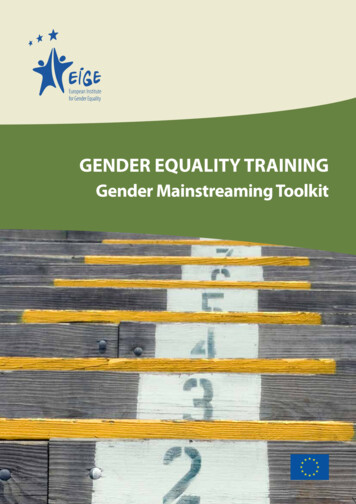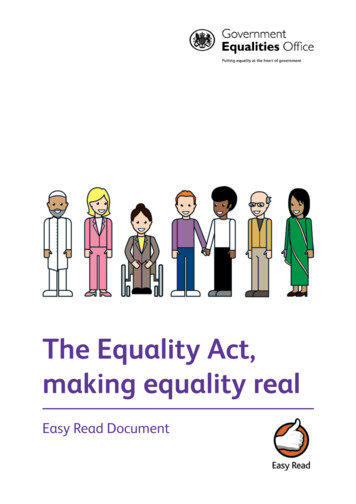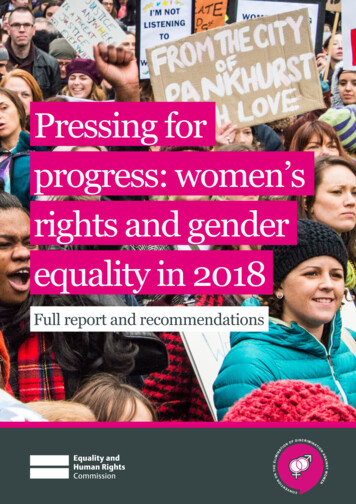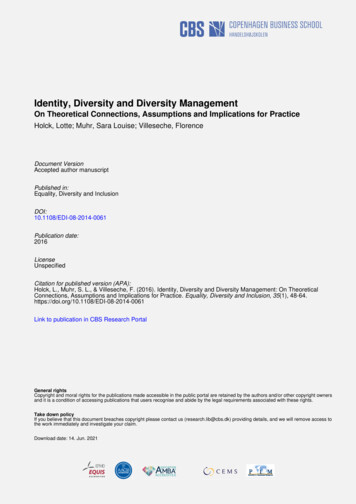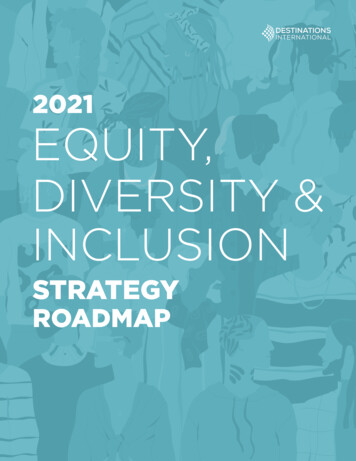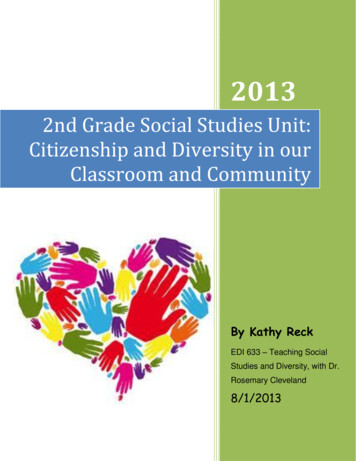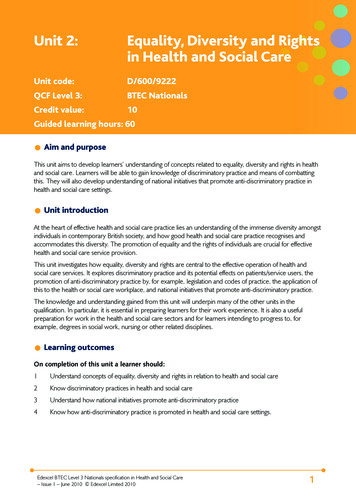
Transcription
Unit 2:Equality, Diversity and Rightsin Health and Social CareUnit code:D/600/9222QCF Level 3:BTEC NationalsCredit value:10Guided learning hours: 60Aim and purposeThis unit aims to develop learners’ understanding of concepts related to equality, diversity and rights in healthand social care. Learners will be able to gain knowledge of discriminatory practice and means of combattingthis. They will also develop understanding of national initiatives that promote anti-discriminatory practice inhealth and social care settings.Unit introductionAt the heart of effective health and social care practice lies an understanding of the immense diversity amongstindividuals in contemporary British society, and how good health and social care practice recognises andaccommodates this diversity. The promotion of equality and the rights of individuals are crucial for effectivehealth and social care service provision.This unit investigates how equality, diversity and rights are central to the effective operation of health andsocial care services. It explores discriminatory practice and its potential effects on patients/service users, thepromotion of anti-discriminatory practice by, for example, legislation and codes of practice, the application ofthis to the health or social care workplace, and national initiatives that promote anti-discriminatory practice.The knowledge and understanding gained from this unit will underpin many of the other units in thequalification. In particular, it is essential in preparing learners for their work experience. It is also a usefulpreparation for work in the health and social care sectors and for learners intending to progress to, forexample, degrees in social work, nursing or other related disciplines.Learning outcomesOn completion of this unit a learner should:1Understand concepts of equality, diversity and rights in relation to health and social care2Know discriminatory practices in health and social care3Understand how national initiatives promote anti-discriminatory practice4Know how anti-discriminatory practice is promoted in health and social care settings.Edexcel BTEC Level 3 Nationals specification in Health and Social Care– Issue 1 – June 2010 Edexcel Limited 20101
Unit content1 Understand concepts of equality, diversity and rights in relation to health and socialcareBenefits of diversity: social/cultural, eg the arts, diet, education, language, cultural enrichment, tolerance,social cohesion; economic, eg employment, expertiseTerminology: correct use of, eg equality, equity, diversity, rights, opportunity, difference, overtdiscrimination, covert discrimination, stereotyping, labelling, prejudice, disadvantage, beliefs, values,vulnerability, abuse, empowerment, independence, interdependence, racism, sexism, homophobiaSettings: health and/or social care settings, eg residential, day care, nursing care, domiciliary careActive promotion of equality and individual rights in health and social care settings: principles of thecare value base; putting the patient/service user at the heart of service provision, eg providing activesupport, promoting individuals’ rights, choices and wellbeing, anti-discriminatory practice, empoweringpatients/service users; dealing with tensions and contradictions; staff development and training; practicalimplications of confidentiality, eg recording, reporting, storing and sharing of informationIndividual rights: the right to be respected, treated equally and not discriminated against, treated as anindividual, treated in a dignified way, allowed privacy, protected from danger and harm, allowed access toinformation about themselves, be able to communicate using their preferred methods of communicationand language, cared for in a way that meets their needs, takes account of their choices and protects them2 Know discriminatory practices in health and social careBasis of discrimination: factors, eg culture, disabilities, age, social class, gender, sexuality, health status,family status, cognitive abilityDiscriminatory practice: types, eg infringement of rights, covert or overt abuse of power, prejudice,stereotyping, labelling, bullying, abuseEffects: marginalisation, disempowerment, low self-esteem and self-identity, restricted opportunities,negative behaviours such as aggression or criminalityLoss of rights: overriding individual rights, eg by the use of power and force; statutory powers2Edexcel BTEC Level 3 Nationals specification in Health and Social Care– Issue 1 – June 2010 Edexcel Limited 2010
3 Understand how national initiatives promote anti-discriminatory practiceConventions, legislation and regulations: relevant sections from, eg European Convention on HumanRights and Fundamental Freedoms 1950, Sex Discrimination Act 1975, Mental Health Act 1983, MentalHealth (Northern Ireland) Order 1986, The Convention on the Rights of the Child 1989, The ChildrenAct 1989, Race Relations (Amendment) Act 2000, Disability Discrimination Act 2005, Human RightsAct 1998, Data Protection Act 1998, Nursing and Residential Care Homes Regulations 1984 (amended2002), Care Standards Act 2000, The Children Act 2004, Disability Discrimination Act 2005, MentalCapacity Act 2005, Age Discrimination Act 2006Codes of practice and charters: codes of conduct established by professional bodies; General Social CareCouncil/Care Council for Wales/Northern Ireland Social Care Council codes of practice and rules ofconduct for social care workers and employers; charters, eg entitlement to servicesOrganisational policies and procedures: positive promotion of, eg individual rights, advocacy, work practices,staff development and training, quality issues, complaints procedures, affirmative action, anti-harassment,confidentiality, human rights4 Know how anti-discriminatory practice is promoted in health and social care settingsActive promotion of anti-discriminatory practice: ethical principles; putting the patient/service user at theheart of service provision, eg providing active support consistent with the beliefs, culture and preferencesof the individual, supporting individuals to express their needs and preferences, empowering individuals,promoting individuals’ rights, choices and wellbeing; balancing individual rights with the rights of others;dealing with conflicts; identifying and challenging discriminationPersonal beliefs and value systems: influences on, eg culture, beliefs, past events, socialisation,environmental influences, health and wellbeing; developing greater self-awareness and tolerance ofdifferences; committing to the care value base; careful use of language; working within legal, ethical andpolicy guidelinesEdexcel BTEC Level 3 Nationals specification in Health and Social Care– Issue 1 – June 2010 Edexcel Limited 20103
Assessment and grading criteriaIn order to pass this unit, the evidence that the learner presents for assessment needs to demonstrate thatthey can meet all the learning outcomes for the unit. The assessment criteria for a pass grade describe thelevel of achievement required to pass this unit.Assessment and grading criteriaTo achieve a pass grade theevidence must show that thelearner is able to:To achieve a merit grade theevidence must show that, inaddition to the pass criteria,the learner is able to:P1explain the concepts ofequality, diversity and rights inrelation to health and socialcare[IE3; IE4; CT2; CT4]P2describe discriminatorypractice in health and socialcare[CT4]P3describe the potential effectsof discriminatory practiceon those who use health orsocial care services[IE3; CT2; CT4; SM3; RL6]P4explain how nationalinitiatives promote antidiscriminatory practice[IE3; CT2]P5describe how antiM3 discuss difficulties that maydiscriminatory practice isarise when implementingpromoted in health and socialanti-discriminatory practicecare settings.in health and social care[IE3, CT2; SM3; RL6]settings.To achieve a distinction gradethe evidence must show that,in addition to the pass andmerit criteria, the learner isable to:M1 assess the effects on thoseusing the service of threedifferent discriminatorypractices in health and socialcare settingsM2 assess the influence of aD1recent national policy initiativepromoting anti-discriminatorypracticeD2evaluate the success of arecent initiative in promotinganti-discriminatory practicejustify ways of overcomingdifficulties that may arisewhen implementing antidiscriminatory practicesin health and social caresettings.PLTS: This summary references where applicable, in the square brackets, the elements of the personal,learning and thinking skills which are embedded in the assessment of this unit. By achieving the criteria,learners will have demonstrated effective application of the referenced elements of the skills.Key4IE – independent enquirersRL – reflective learnersSM – self-managersCT – creative thinkersTW – team workersEP – effective participatorsEdexcel BTEC Level 3 Nationals specification in Health and Social Care– Issue 1 – June 2010 Edexcel Limited 2010
Essential guidance for tutorsDeliveryThis unit should be delivered using a mixture of tutor input and learner-led activity such as research, role playand case studies and, where appropriate, guest speakers from a variety of health and social care settings andother appropriate practitioners.Learners will need considerable guidance in exploring the areas covered by this unit, and some structuredteaching will be needed to introduce the necessary concepts. The unit does, however, provide considerablescope for encouraging discussion and debate, but sensitivity and tact will need to be exercised when learnersbegin to consider their own prejudices and experiences.Initially, learners should explore the concepts of equality, diversity and rights and their relevance to differenthealth and social care settings. Learners could work in small groups to identify these concepts, and considerthe principles underlying the practices of the different practitioners within health and social care settings.Once learners are familiar with the concepts and have investigated discriminatory and anti-discriminatorypractices they can then progress to look at the potential effects of these practices on health and social careservice users and the national initiatives to reduce and eliminate discriminatory practice within health andsocial care.Learners should be given opportunities, and time, to develop and practise their research skills when carryingout their investigations for this unit. Arrangements for interactions within the workplace should be discussedand agreed with the tutor and work supervisor/mentor.Appropriate guest speakers will develop learner understanding and interest further, providing learners with theopportunity to question practitioners. Time should be put aside for learners to prepare questions for visitingpractitioners before their visit to get the most out of these opportunities.Learners should be encouraged to improve their self-awareness, reflecting on their personal beliefs andconsidering their prejudices, including potential influences on these. Learners may need to be supported infacing the challenge of some of their beliefs and prejudices, but they need to be aware that this is an importantpart of their personal development, and also an important part of preparation for professional life in the healthor social care sectors.Edexcel BTEC Level 3 Nationals specification in Health and Social Care– Issue 1 – June 2010 Edexcel Limited 20105
Outline learning planThe outline learning plan has been included in this unit as guidance and can be used in conjunction with theprogramme of suggested assignments.The outline learning plan demonstrates one way in planning the delivery and assessment of this unit.Topic and suggested assignments/activities and/assessmentUnit introduction.Guest speaker: for example equal opportunities officer.Learning outcome 1Tutor input: concepts of equality, diversity and rights in relation to health and social care.Buzz group/learner research: different concepts of equality, diversity and rights.Case studies/discussion: from health and social care settings.Learning outcome 2Tutor input: discriminatory practices in health and social care.Learner research: diversity and equality/inequalities.Q&A guest speakers: from a variety of different local authority backgrounds and organisations.Learner research: on discriminatory practices at the workplace (using work-placement experience).Case studies: on social inequalities and rights.Learner research/discussion: government attempts to tackle the problem of social inequalities and discriminatorypractices.Assignment 1: Concepts and discriminatory and anti-discriminatory practices (P1, P2, P3, M1)Produce a presentation covering: an explanation of the concepts of equality, diversity and rights in relation to health and social care a description of discriminatory practice in health and social care a description of the potential effects of discriminatory practice on service users of health or social careservicesan assessment of the effects on those using the service of three different discriminatory practices in health andsocial care settingsLearning outcome 3Tutor input: how national initiatives promote anti-discriminatory practice.Learner research: national initiatives to promote anti-discriminatory practice.Q&A guest speakers: involved in national initiatives to promote anti-discriminatory practice.Case studies: of national initiatives.Learning outcome 4Tutor input: how anti-discriminatory practice is promoted in health and social care settings.Buzz group: different examples of anti-discriminatory practice within different health and social care settings.Learner research: investigate a health or social care setting and Q&A practitioners there on how antidiscriminatory practice is promoted at their setting and how they are involved in this.Learner research: investigate legislation and policies supporting anti-discriminatory practice and how the worksetting works within this to promote anti-discriminatory practice.6Edexcel BTEC Level 3 Nationals specification in Health and Social Care– Issue 1 – June 2010 Edexcel Limited 2010
Topic and suggested assignments/activities and/assessmentAssignment 2: National initiatives and anti-discriminatory practice (P4, P5, M2, M3, D1 and D2)Produce an information booklet covering: an explanation of how national initiatives promote anti-discriminatory a description of how anti-discriminatory practice is promoted in health and social care an assessment of the influence of a recent national policy initiative promoting anti-discriminatory practice a discussion of the difficulties that may arise when implementing anti-discriminatory practice in health andsocial care settingsan evaluation of the success of the recent initiative in promoting anti-discriminatory practicea justification of ways of overcoming difficulties that may arise when implementing anti-discriminatorypractices in health and social care settings.Unit review and assessment.AssessmentThis unit should be delivered and assessed with as much employer engagement/workplace learningopportunities as is appropriate and relevant.The learning outcomes for this unit could be met through two different assignments where learners are askedto present their evidence using a variety of methods.The presentation evidence for Assignment 1 should be assessed/witnessed by the tutor and an observation/witness record completed detailing where learners have met a learning outcome and the tutor’s writtenjustification for this. Tutors may also like to copy their presentation PowerPoint slides and any handouts theyused as extra evidence.Learning outcome 1 is achieved by meeting assessment criterion P1, and learning outcome 2 by the meetingP2, P3 and M1, explaining the concepts of equality, diversity and rights in relation to health and social care,and describing discriminatory practice in health and social care and the potential effects of this practice onhealth or social care practitioners. M1 completes achievement of learning outcome 2 by assessing the effectson those using the service of three different discriminatory practices in health and social care settings.The second assignment could be presented in the form of an information booklet. This assignment meetslearning outcomes 3 and 4.Learning outcome 3 is achieved by meeting assessment criteria P4, M2 and D1 by explaining how nationalinitiatives promote anti-discriminatory practices, assessing the influence of a recent national initiative promotinganti-discriminatory practice and evaluating of the success of the relevant initiative in promoting antidiscriminatory practice. In order to achieve M2, learners need to choose a recent or emerging national policydevelopment and assess how it influences organisational policy regarding anti-discriminatory practice. Learnerscould use their work experience placements as the basis of their explanation, but visits to other health orsocial care environments could also be used. For D1, learners need to evaluate how the recent or emergingpolicy development influences organisational and personal practice in relation to anti-discriminatory practice. Adiscussion of the strengths and weaknesses of the policy development and its effects on practice is required.Learning outcome 4 is achieved by meeting assessment criteria P5, M3 and D2 by describing how antidiscriminatory practice is promoted in health and social care settings, discussing the difficulties that may arisewhen implementing anti-discriminatory practice and justifying ways of overcoming these difficulties.Edexcel BTEC Level 3 Nationals specification in Health and Social Care– Issue 1 – June 2010 Edexcel Limited 20107
The assignments set can be assessed whenever is the most appropriate time for the tutor and learners, theorder in which they should be completed is up to the tutor. However it is probably best to do Assignment 1first as a solid foundation for the learning outcomes and assignments to follow.The use of guest speakers is encouraged, as are visits to appropriate health and social care settings to talk toappropriate staff. Learners will get the most out of these opportunities by being given time before them toplan and design questions, based around the learning outcomes, to ask whilst on a visit or a guest speaker.In order to pass the unit learners must achieve a pass grade for each learning outcome, all five pass criteriaare spread across both assignments and both assignments must be covered and assessed. All five pass criteriamust be achieved before merit grade criteria can be assessed,; the merit criteria must be achieved beforedistinction grade criteria can be assessed.Learners may wish to carry out their plans and investigations/research in small friendship groups, this isacceptable but final evidence for assessment must be individually produced pieces of work.Programme of suggested assignmentsThe table below shows a programme of suggested assignments that cover the pass, merit and distinctioncriteria in the assessment and grading grid. This is for guidance and it is recommended that centres eitherwrite their own assignments or adapt any Edexcel assignments to meet local needs and resources.Criteria coveredAssignment titleScenarioAssessment methodP1, P2, P3, M1Concepts anddiscriminatory and antidiscriminatory practicesPresentationP4, P5, M2, M3,D1, D2National initiatives andanti-discriminatorypracticeYou have been appointedas your workplace’s equalopportunities officer andhave to put together apresentation and informationbooklet to help train staff atyour workplace, as part oftheir ongoing CPD, regardingequality, diversity, rights andanti-discriminatory practice.Information bookletLinks to National Occupational Standards (NOS), other BTEC units, other BTECqualifications and other relevant units and qualificationsThis unit forms part of the BTEC Health and Social Care sector suite (see Appendix A) and has links with unitsfrom other qualifications in that suite. See Appendix E for NOS links and Appendix G for a mapping of the NHSKnowledge and Skills Framework against particular units in this qualification.Essential resourcesLearners will require access to library facilities, including relevant texts, professional magazines and journals,CD ROMs, current newspapers. They will need ICT facilities including the internet, with tutor guidance toavoid inappropriate use. Guest speakers who work in the statutory, private and voluntary sectors will enhancethe learning experience.8Edexcel BTEC Level 3 Nationals specification in Health and Social Care– Issue 1 – June 2010 Edexcel Limited 2010
Employer engagement and vocational contextsVisits from speakers employed within the health and social care sectors and representatives of ethnic minoritygroups will enhance learner understanding. Learners would also benefit from visits to organisations whichpromote the rights of individuals such as Age Concern, Disability Living Centres and Asian women’s projects.The local authority will be useful for this unit. They will have several departments who deal with communityinequalities as part of their daily work. The first point of contact for this unit in this context will be the localauthority human resources department.Indicative reading for learnersTextbooksAsbridge L, Lavers S, Moonie N and Scott J – BTEC First Health and Social Care (Heinemann, 2006)ISBN 9780435463328Baldock J, Manning N, Miller S and Vickerstaff S – Social Policy (Oxford University Press, 2007)ISBN 9780199284979Clarke L – Health and Social Care GCSE (Nelson Thornes, 2002) ISBN 9780748770724Eden S – Society, Health and Development Level 1 Foundation Diploma (Pearson, 2008) ISBN 9780435500900Haworth E, Allen B, Forshaw C, Nicol D, Volbracht A and Leach J – Society, Health and Development Level 2Higher Diploma (Pearson, 2008) ISBN 9780435401030Lovell T and Cordeaux C – Social Policy for Health and Social Care (Hodder and Stoughton, 1999)ISBN 9780340683613Mason L, Horne S and Irvine J – BTEC Introduction Health and Social Care (Heinemann, 2004)ISBN 978435462451Moore S – Social Welfare Alive Third Edition (Nelson Thornes, 2002) ISBN 9780748765614Stretch B and Whitehouse M – BTEC Level 3 Nationals in Health and Social Care Student Book 1 (Pearson,2010) ISBN 9781846907663Stretch B and Whitehouse M– BTEC Level 3 Nationals in Health and Social Care Student Book 2 (Pearson,2010) ISBN 9781846907470Journals and magazinesCommunity Care MagazineGeneral Social Care Council Codes of ealth.org.ukAge ConcernDepartment of HealthEqual Opportunities CommissionCare and support website for people with learningdisabilitiesRoyal National Institute of Blind PeopleRoyal National Institute for Deaf PeopleSocial Care Institute for ExcellenceSector Skills Council for the UK Health SectorEdexcel BTEC Level 3 Nationals specification in Health and Social Care– Issue 1 – June 2010 Edexcel Limited 20109
Delivery of personal, learning and thinking skillsThe table below identifies the opportunities for personal, learning and thinking skills (PLTS) that have beenincluded within the pass assessment criteria of this unit.SkillWhen learners are Independent enquirers[IE3] exploring issues, events or problems from different perspectives, for exampleconcepts of equality, diversity, rights and the effects of discriminatory practice[IE4] analysing and evaluating information, judging its relevance and valueCreative thinkers[CT2] asking questions to extend their thinking about concepts of equality,diversity and rights, and the effects of discriminatory practice[CT4] questioning their own and others’ assumptionsReflective learners[RL6] presenting work in a variety of formats for assessmentSelf-managers[SM3] organising time and resources, prioritising actions to meet assessmentdeadlines.10Edexcel BTEC Level 3 Nationals specification in Health and Social Care– Issue 1 – June 2010 Edexcel Limited 2010
Functional Skills – Level 2SkillWhen learners are ICT – Use ICT systemsManage information storage to enableefficient retrievalretrieving work saved throughout their investigation into theconcepts of equality, diversity and discriminatory practicesICT – Find and select informationSelect and use a variety of sources ofresearching and investigating national initiatives to reduceinformation independently for a complex task discriminatory practiceICT – Develop, present andcommunicate informationBring together information to suit contentand purposeorganising findings from research to suit assignments as evidencefor assignmentsPresent information in ways that are fit forpurpose and audiencepreparing assignments in different ways for their intendedpurposeEnglishSpeaking and listening – make a range ofcontributions to discussions and makeeffective presentations in a wide range ofcontextsdiscussing a national initiative to promote anti-discriminatorypracticeReading – compare, select, read andunderstand texts and use them to gatherinformation, ideas, arguments and opinionsresearching textbooks and websites regarding equality andnational initiativesWriting – write documents, includingextended writing pieces, communicatinginformation, ideas and opinions, effectivelyand persuasivelypreparing an information booklet for the second assignment.Edexcel BTEC Level 3 Nationals specification in Health and Social Care– Issue 1 – June 2010 Edexcel Limited 201011
Act 1998, Data Protection Act 1998, Nursing and Residential Care Homes Regulations 1984 (amended 2002), Care Standards Act 2000, The Children Act 2004, Disability Discrimination Act 2005, Mental Capacity Act 2005, Age Discrimination Act 2006 Codes of practice and charters: codes of conduct established by professional bodies; General Social Care
